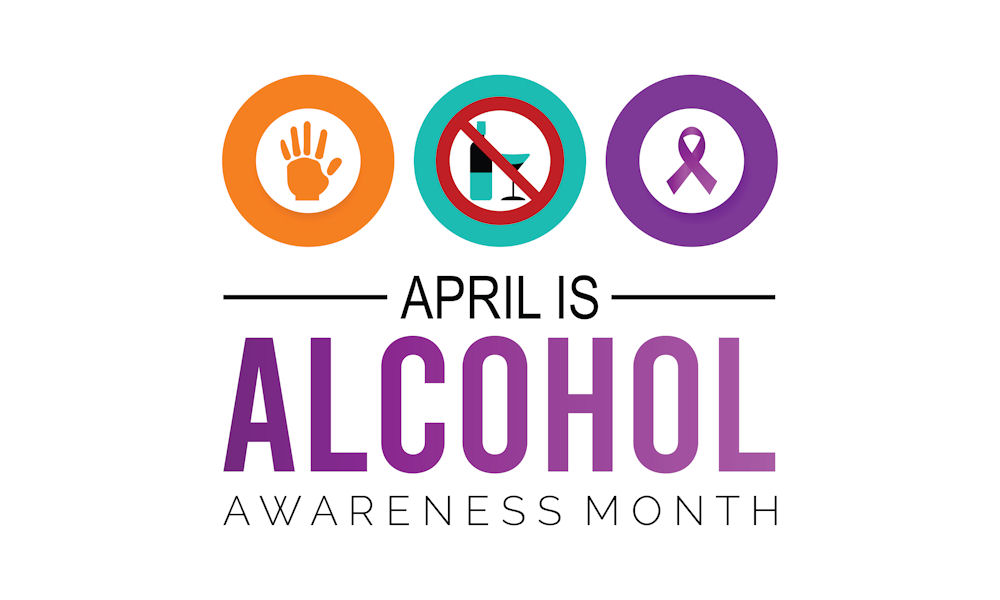April is Alcohol Awareness Month. This is a time to increase education and share resources that can help people learn about the dangers of alcohol. Raising awareness can also increase support for alcohol-related issues and encourage people to seek help if they struggle with alcohol use.
What Is Alcohol Use Disorder (AUD)?
Alcohol Use Disorder (AUD) is a condition where an individual drinks an excessive amount of alcohol. This causes distress and physical as well as emotional harm. The Diagnostic and Statistical Manual of Mental Disorders (DSM) classifies alcoholism as a substance use disorder and defines it as any alcohol consumption that results in significant impairment or distress. The manual outlines these criteria to diagnose someone with an alcohol use disorder:
- Alcohol tolerance
- Withdrawal symptoms
- Drinking more than intended
- Unable to cut down or stop
- Time-consuming
- Isolation and withdraw
- Drinking despite consequences
- Missing work or school due to alcohol
- Cravings
- Dangerous activities while drinking
If you meet two or more of these criteria within 12 months, it’s important to seek help as you may have AUD. With even one of these symptoms, you may consider talking to a professional and seeking out an alcohol recovery program.
Signs of an Alcohol Problem
Signs of alcohol abuse can be difficult to spot because someone suffering from addiction will likely hide their problems. Alcohol Use Disorder can manifest in a variety of ways and behaviors. Here are some signs that you or a loved one has an alcohol problem:
Increased tolerance
When you drink large amounts over an extended amount of time you’re likely to develop a tolerance to alcohol. This means you may have to drink even more to feel the effects of drinking. Drinking excessively and frequently can even change your brain chemistry. So when you drink it requires more alcohol to produce the same levels of dopamine.
Withdrawal symptoms
Withdrawal symptoms occur when you’re addicted to a substance and stop using it. If you try to quit drinking and experience symptoms such as nausea, anxiety, sweating, headaches, or tremors, then you may be in withdrawal. If you notice these symptoms, you may need medical attention.
Drinking in secret
Drinking alone or in secret is often a sign of problematic drinking. If you’re ashamed of your drinking and are trying to hide this habit from others, it may be an issue. For your loved ones, this is a hard sign to notice, but you can look out for signs of trying to hide alcohol consumption.
Drinking to relieve stress
Some turn to alcohol to help relieve stress or cope with anxiety. This creates an unhealthy relationship with the substance. If you use alcohol as a coping mechanism you should get help. Some treatment centers also offer mental health services.
Relationship issues
Alcohol abuse can cause a strain on relationships. This is because, when struggling with a drinking problem, you may neglect responsibilities or experience mood swings. Other negative behaviors such as lying also often coincide with substance abuse disorders. If you or someone you know is struggling with maintaining relationships, this can indicate a problem.
Prioritizing drinking
Alcohol Use Disorder is characterized by a preoccupation with drinking. So, if you find yourself prioritizing drinking or thinking about it obsessively, this could be a sign.
Neglecting responsibilities
If your drinking causes you to miss work, school, or other obligations, then you may need help. The effects of alcohol abuse can make it difficult to perform daily tasks. For example, you may find it difficult to concentrate at work and complete assignments.
Legal trouble
Legal troubles are a good indicator of an alcohol problem. If you or a loved one get in trouble for driving under the influence or public intoxication, it may be time to go to rehab.
Physical changes
Alcohol use can cause physical changes to your body. This includes weight gain, bloating, and redness in your face. Sometimes alcohol abuse can lead to a disheveled appearance.
When Is It Time for Treatment?

When substance use is interfering with your quality of life, it’s time to seek treatment. It’s smart to start treating an alcohol problem as soon as you notice it, even if the problem seems slight. If you notice that you’re drinking or craving a drink more frequently, it might be time to talk to a professional. Similarly, if you think that a loved one is prioritizing alcohol over other responsibilities or aspects of their life, encourage them to get help.
Does Treatment Work?
Treatment for Alcohol Use Disorder is very effective but success can vary based on the severity of the disorder, the type of treatment, and your commitment to recovery. With proper detoxing, rehab, and support, people can recover and live better lives. People choose Granite Mountain Behavioral Healthcare because we offer treatment that provides healing for your mind and body, so you’re more likely to stick to your recovery plan.
We believe that with a strong support group, determination, and addiction recovery resources, you can keep your commitment to sobriety.
Types of Treatment

There are different types of treatment for Alcohol Use Disorder. After an assessment, your care provider will help you determine the best treatment plan. Here are some common treatments for AUD:
- Behavioral treatments: These help your mental health and include therapies such as cognitive behavioral therapy (CBT) and dialectical behavioral therapy (DBT).
- Medications: Medication-assisted treatment (MAT) can help treat symptoms of withdrawal and some medications may be prescribed to support long-term recovery.
- Mutual-support groups: After attending rehab, going to a support group can be very beneficial and keep you on track for your sobriety.
How To Raise Awareness During Alcohol Awareness Month
You can help raise awareness for alcohol-related issues by volunteering your time with organizations or support groups that advocate for treating addiction. If you have experience with alcohol addiction or dealing with the addiction of a loved one, your story can help others.
During April, there may be special events such as health fairs or workshops that you can attend to show your support and also learn more about alcohol abuse. Another good way to raise awareness is by sharing information and resources online. If you use social media, this may provide an opportunity to reach more people with information about how to prevent, recognize, and handle substance abuse issues.
Receive Help For Alcohol Addiction at Granite Mountain Behavioral Healthcare

Our team at Granite Mountain wants to help you or your loved one achieve long-term sobriety. We can develop a treatment plan specifically for you and provide all the necessary tools to overcome addiction. Here, you receive the help you need in whichever form that takes. This includes detox, inpatient rehabilitation, outpatient care, and medically-assisted treatment.
Alcohol Awareness Month is the perfect time to reclaim your life from alcohol. Call us today and learn how we can help you start on your journey to recovery. We’re here to answer all your questions about addiction, rehab, and living a sober lifestyle.



